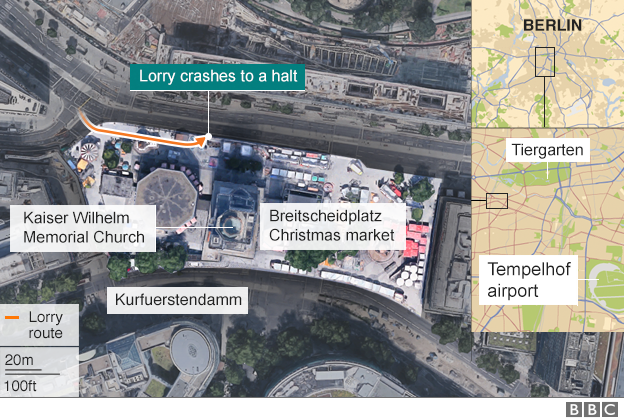Berlin attack: So-called Islamic State claims responsibility
- Published
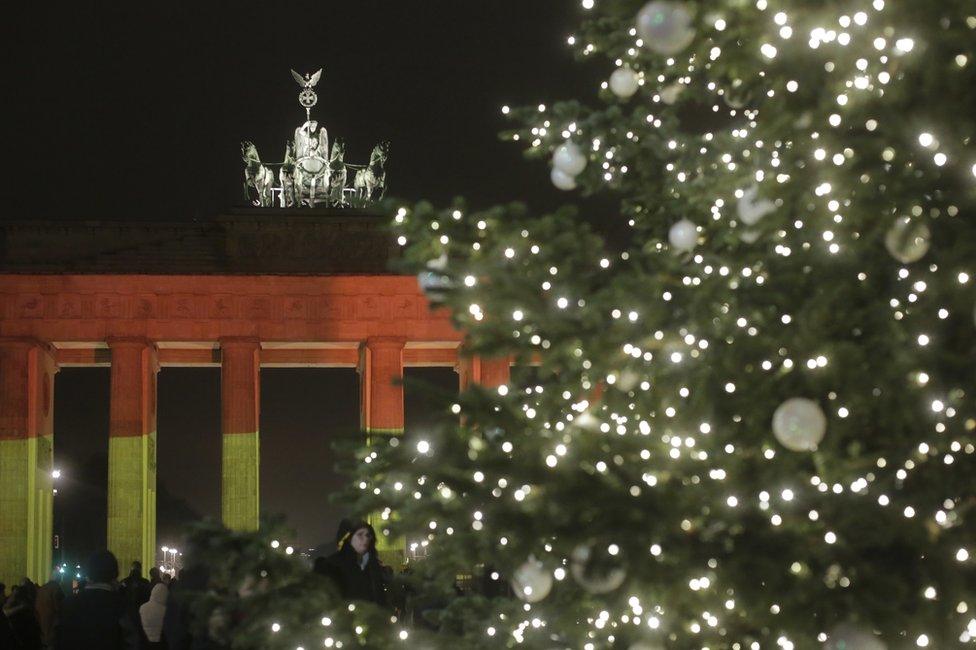
Berlin's iconic Brandenburg Gate was illuminated in the colours of the national flag in tribute to the victims
So-called Islamic State (IS) has said one of its militants carried out the lorry attack on a Berlin Christmas market, which left 12 people dead.
The identity of the attacker has not been established and there was no immediate way of verifying the claim.
German prosecutors have freed the only suspect, citing insufficient evidence. He was identified by media only as Pakistani national Naved B.
Officials suggested that a perpetrator or perpetrators might be on the run.
IS said through its news agency that one of its "soldiers" had carried out the attack, in which 49 people were also injured, "in response to calls to target nationals of the coalition countries".
German Interior Minister Thomas De Maiziere reacted cautiously to the claim, saying "several lines of investigation" were being pursued.
Before the suspect was released late on Tuesday, German officials said they could not be sure if he was involved in the attack.
Federal prosecutor Peter Frank told reporters that the style of attack and the choice of target suggested Islamic extremism.
In other developments:
The UN Security Council condemned "the barbaric and cowardly terrorist attack", saying "any acts of terrorism are criminal and unjustifiable, regardless of their motivation, wherever, whenever and by whomsoever committed"
Police in London brought forward plans to close roads around Buckingham Palace during the Changing of the Guard ceremony, an event which regularly attracts large crowds
Real Madrid and Brose Bamberg basketball players observed a minute's silence for the victims before their Euroleague game at Sports Palace of Madrid
Police stepped up patrols at Christmas markets in cities across the world

IS opportunism? Analysis by Gordon Corera, BBC Security Correspondent

The IS claim does not prove much in terms of the attack in Berlin. The group often refers to individuals who carry out attacks as its "soldiers" but the crucial question is firstly whether the individual had any form of direct contact with IS.
Face-to-face or online communication are possible but far from certain. If there was no direct contact, it could still be the case that an individual was inspired rather than directed by the group.
In this case, an individual may leave his or her own pledge of allegiance in written form or online or in a video.
But until such evidence emerges, it remains hard to know if this is just an opportunistic claim by the group rather than one based on real substance.

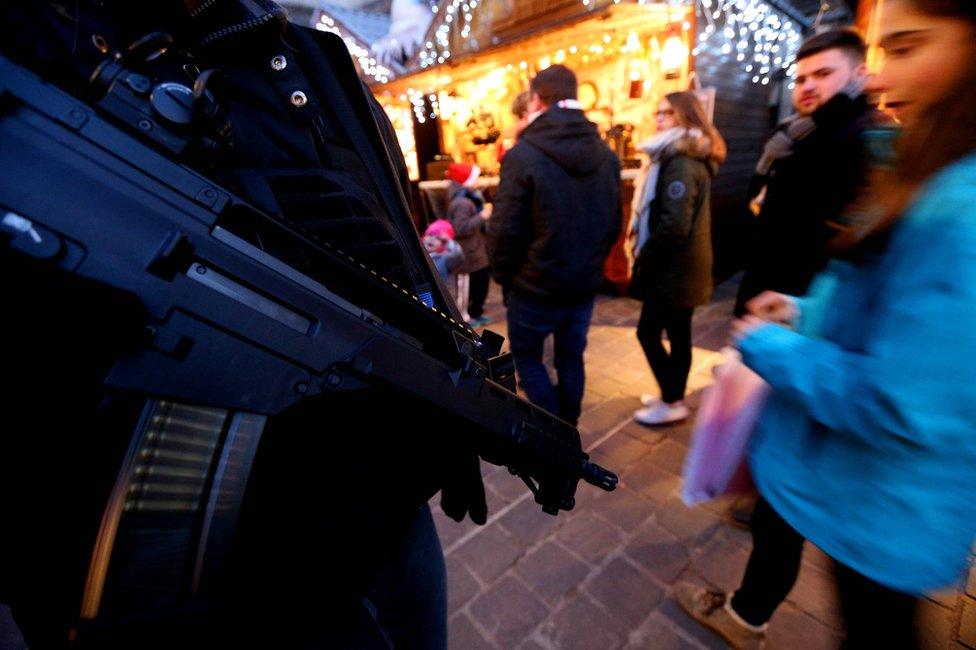
Armed police patrolled French Christmas markets like this one in Reims
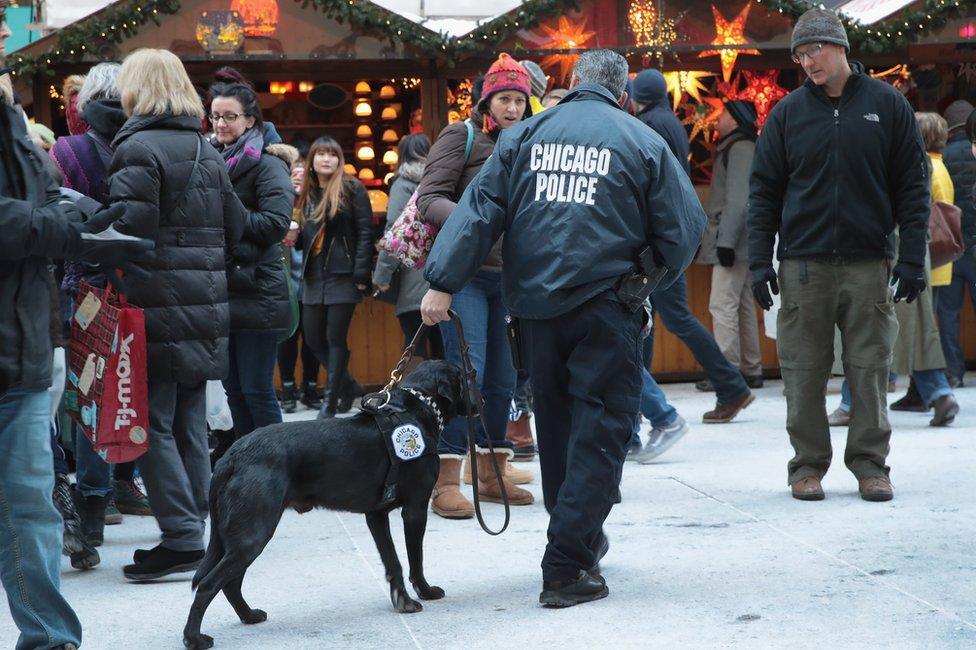
A sniffer dig was used to check for explosives at Chicago's Christkindlmarket
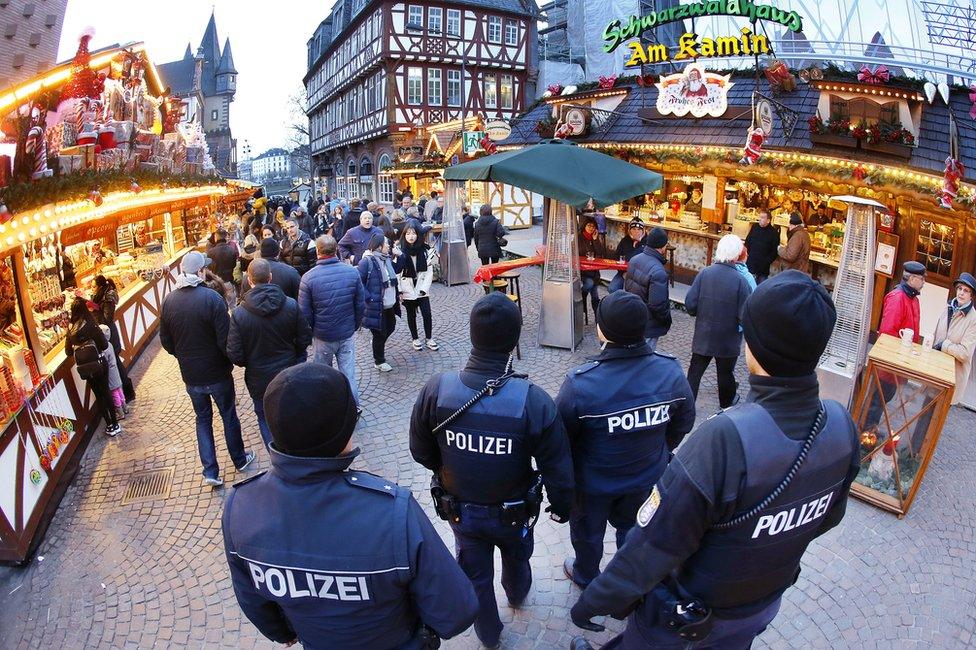
Police patrolled a Christmas market in the German city of Frankfurt
The sole suspect was captured in a park after reportedly fleeing the scene and being tracked by a member of the public, who alerted the police.
The lorry's original driver, Polish citizen Lukasz Urban, was found dead on the passenger seat, reportedly with gunshot and stab wounds to his body. No gun was recovered.

An archive image has been released believed to show murdered lorry driver Lukasz Urban
Among those who suffered injuries in the attack was Inaki Ellakuria, a 21-year-old student from Spain, the Associated Press news agency reports.
"I heard the truck crashing against the first stall..." he tweeted, only minutes after the vehicle ran over dozens of shoppers. "It came fast, too fast to be driving off the road accidentally."
Later he tweeted, external (in Spanish): "It hurts every time I think about it. I didn't think I was going to overcome the pain."
On Tuesday, he underwent surgery at a hospital in Berlin for the broken tibia and fibula on his left leg. He also has broken bones in his right ankle and instep, as well as damage to his hip, but he is recovering well, according to his relatives.
Commemoration
A vigil has been held at the Kaiser Wilhelm Memorial Church, next to the Breitscheidplatz Christmas market which was attacked.
German Chancellor Angela Merkel vowed to punish those responsible for the attack "as harshly as the law requires".
She expressed concern that the attacker might turn out to be an asylum seeker: "I know that it would be particularly difficult for us all to bear if it turned out that the person who committed this act was someone who had sought protection and asylum in Germany."
Berlin resident Ibrahim Colak: "I saw whole bodies being twisted"
Her open-door policy on migration, which saw 890,000 asylum seekers arrive in Germany last year, has divided the country, with critics calling it a security threat.
The co-leader of Germany's anti-immigration AfD party, Frauke Petry, blamed Mrs Merkel's liberal policy on migrants, saying: "The milieu in which such acts can flourish has been negligently and systematically imported over the past year and a half."

More pressure on Merkel? BBC's Damian Grammaticas in Berlin

For Angela Merkel the legacy of the Berlin attack will be political. It is not clear who the perpetrator was. But if it proves to be someone who came as a refugee she will face more pressure. She has stuck to her welcoming policy towards refugees fleeing war and persecution, and a majority of Germans have continued to back her.
But Mrs Merkel's political opponents, notably the far right Alternative fur Deutschland (AfD), have attacked her again following the Berlin attack, saying she has compromised Germany's security by letting in people without knowing who they are.
It is a charge they will seek to press as Germany gears up for federal elections next year. The AfD had surged in regional elections this year. But Germany's main parties have all said they will shun any question of sharing power with the AfD.
And Angela Merkel has seen her support rise in recent polls. It is why the issue of who carried out the Berlin attack is vital for Mrs Merkel and her vision of a free, open Germany.

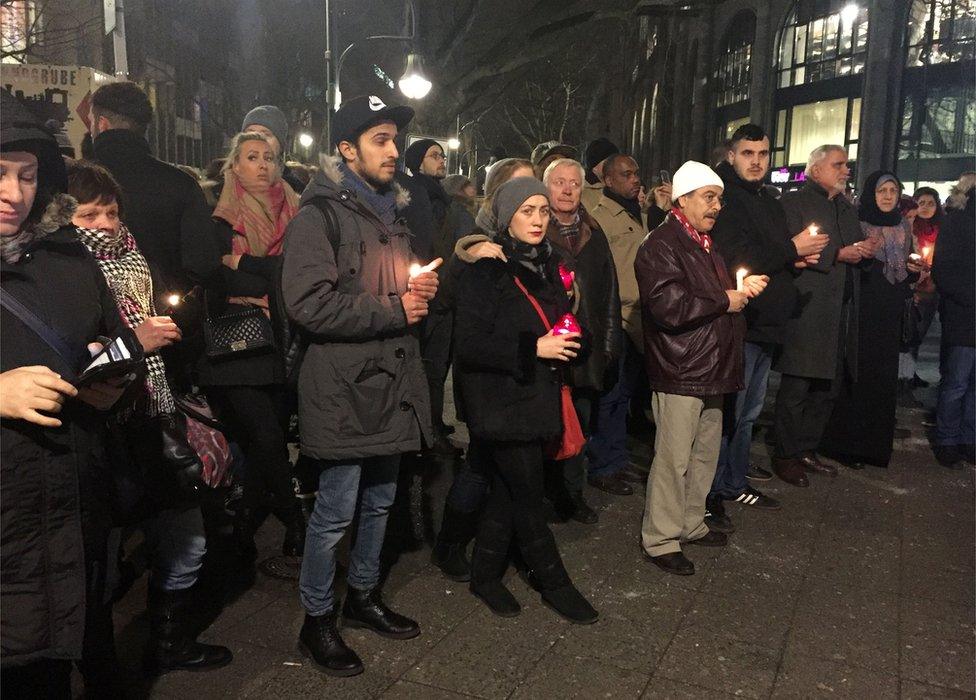
People gathered near the attack site in Berlin with candles on Tuesday to mourn the victims
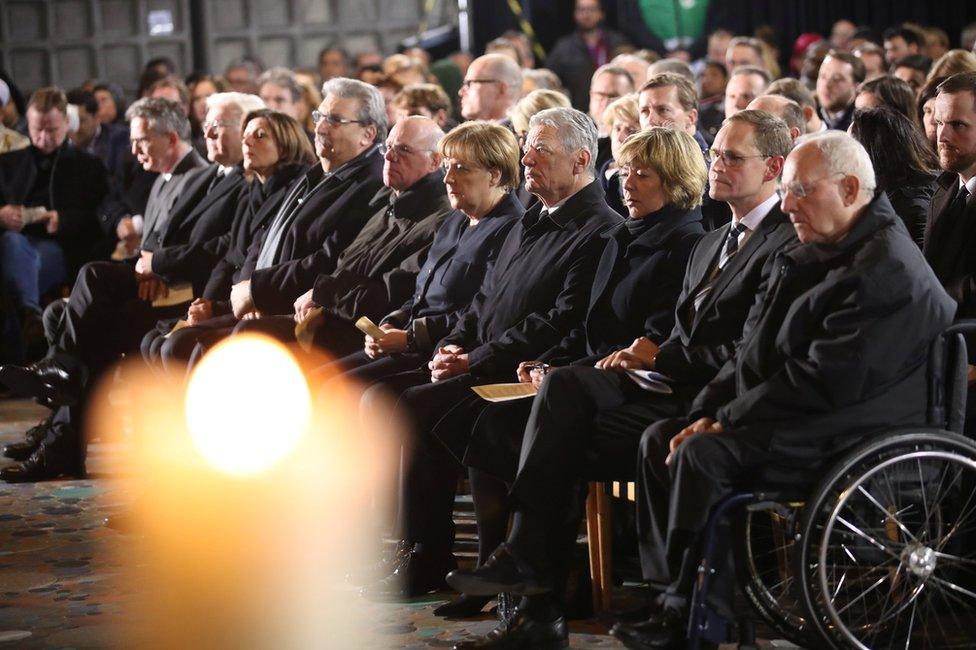
Mrs Merkel (centre) and other politicians attended a commemoration in the Kaiser Wilhelm Memorial Church
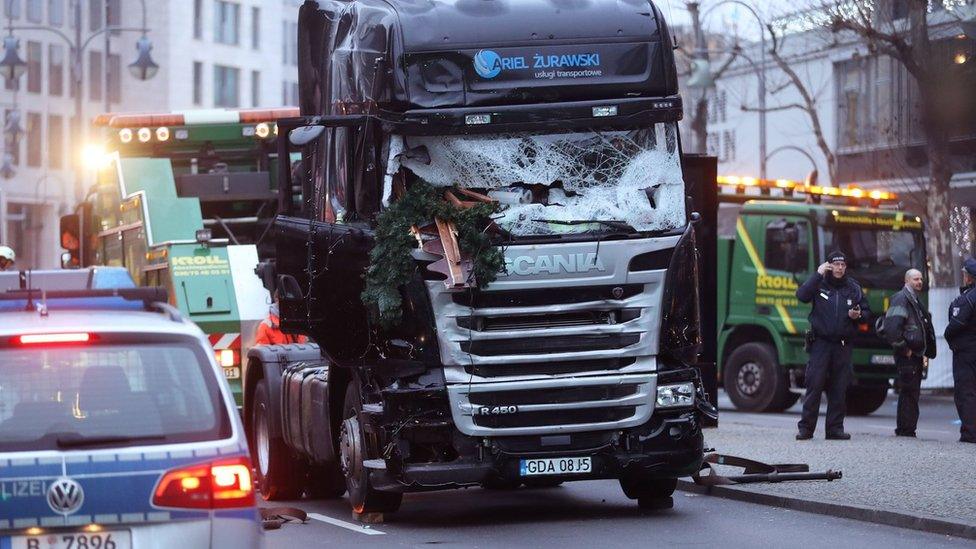
The lorry attack at the Breitscheidplatz market left 12 people dead and 49 injured
Monday's incident mirrored the lorry attack on Bastille Day crowds in the French city of Nice on 14 July, which was also claimed by IS.
Both IS and al-Qaeda have urged their followers to use vehicles as a means to attack crowds.
